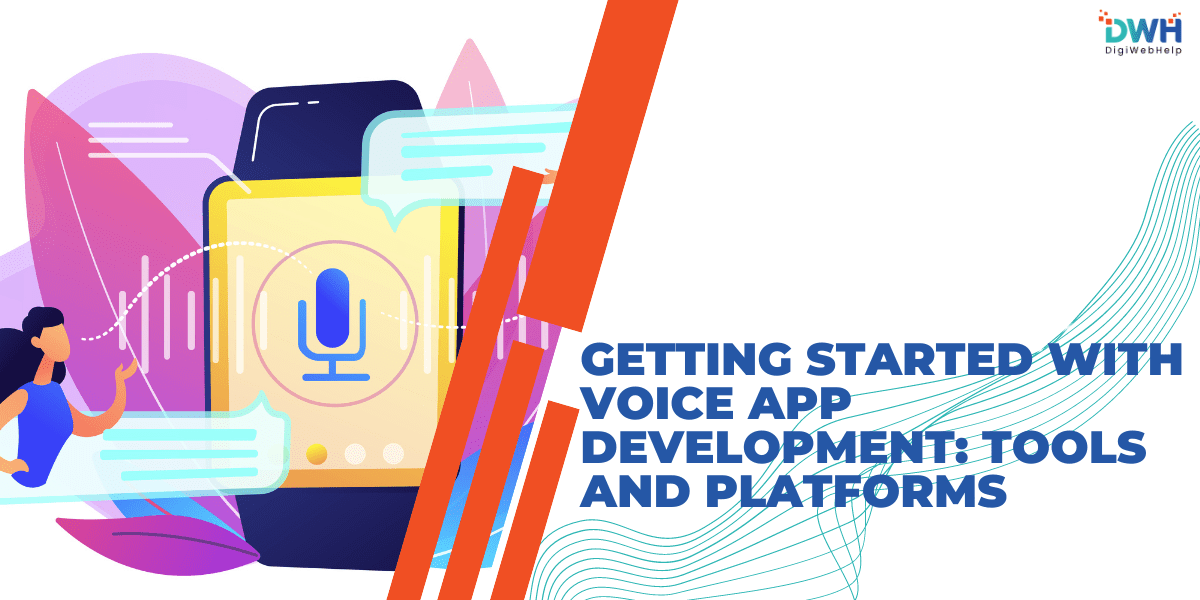
Getting Started with Voice App Development: Tools and Platforms
The rise of AI voice assistants like Alexa, Google Assistant, and Siri has transformed how people interact with technology. Voice app development is no longer a niche area. It is becoming essential for businesses to develop a voice app to provide hands-free, AI-driven user experiences.
Whether you are looking to develop a voice chat application for customer support, smart home, or entertainment, the potential applications of voice apps are vast and growing. In this blog, we will explore the most popular AI voice assistant platforms and introduce some key tools and frameworks to kickstart your voice app development journey.
Understanding the Basics of Voice App Development
Voice apps are applications that allow users to interact with software using voice commands. While traditional apps rely on touch or type-based interfaces, voice apps interpret voice inputs to provide responses. Voice apps use voice recognition, natural language processing, and AI to understand and process human language and provide appropriate responses. The backbone of voice app development is formed using the advancements of artificial intelligence and machine learning (ML), which enables systems to understand and react to human inputs.
A voice app typically consists of the following key components:
- Voice Recognition: The process of converting spoken words into text.
- Natural Language Processing: It interprets the converted text to understand the user’s intent.
- Text-to-Speech: This converts machine response into speech.
What makes voice apps special is the emphasis on user experience (UX). When developing a voice app, the challenge lies in designing an intuitive and conversion-based user interface. This interface should help users successfully complete tasks without the need for visual aids.
Popular AI Voice Assistant Platforms
Several platforms dominate the voice app development landscape. Each platform offers unique tools, APIs, and features for different use cases. Let’s explore some popular AI voice assistant platforms:
Amazon Alexa Skills Kit (ASK)
For Alexa skill development, Amazon offers the Alexa Skills Kit (ASK). It’s packed with APIs and tools for developers. They can use these tools to build unique voice experiences or “skills” for Alexa. This platform is easy to use and widely used in this space. Basically, Alexa skills are voice-driven capabilities that allow users to interact with smart devices, get weather forecasts, play music, or control their home environment.
Key Features of ASK:
- Custom Skills: Developers can build skills tailored to certain requirements.
- Alexa Voice Services (AVS): Enables direct integration of Alexa into devices.
- Built-in APIs: ASK offers a wide range of APIs, useful for controlling smart homes or streaming music.
- Voice Design Tools: These tools assist in simplifying voice-based interactions and improving user experience.
ASK is ideal for developers looking to create voice-controlled smart home systems or enhance user interactions with Alexa-enabled devices.
Google Actions
Google Action development refers to the process of creating voice apps that work with Google Assistant using a conversational model. The platform is supported by its powerful AI and machine learning algorithms. It provides robust voice recognition and natural language understanding capabilities.
Key Features of Google Actions:
- Dialogflow Integration: Google Actions utilizes Dialogflow. This Google tool simplifies building conversational interfaces and integrates natural language understanding.
- Rich User Interactions: Google Actions can offer voice and visual responses on smart displays.
- Contextual Awareness: The Google Assistant can remember context, allowing smoother, more natural conversations with users.
With Google Actions, developers can create apps for smartphones, smart speakers, or displays. Common use cases include customer service, media playback, and smart home integration.
Microsoft Azure Bot Service
Microsoft Azure Bot Service helps developers create advanced and versatile multi-platform voice applications. It integrates voice capabilities across multiple channels like Cortana, Skype, and Microsoft Teams.
Key Features of Azure Bot Service:
- AI and Machine Learning: Azure integrates with cognitive services such as Language Understanding (LUIS), streamlining the development of high-tech conversational bots.
- Multi-Channel Support: Apps developed using Azure Bot Service can be deployed across different platforms. These apps are not limited to voice but also chat-based interactions.
- Serverless Infrastructure: Azure offers scalable, serverless computing, perfect for handling unpredictable voice service demand.
Azure Bot Service caters to developers looking to integrate voice services with enterprise-level applications, providing more flexibility and scalability than other platforms.
Apple SiriKit
SiriKit from Apple lets developers craft apps that work seamlessly with Siri. However, SiriKit isn’t as flexible as other platforms. It only supports a limited range of apps like chat, ride-booking, and payments.
Key Features of SiriKit:
- Domain-Specific Integrations: SiriKit supports specific domains like calling, messaging, and payments, restricting the types of apps you can develop using SiriKit.
- Deep Integration with iOS: Apps can use Siri shortcuts, allowing users to create custom voice commands.
Even though SiriKit’s scope is limited, it’s helpful for developers who focus on niche apps that benefit from tight integration with iOS and Apple’s ecosystem.
Tools and Frameworks for Voice App Development
Developing voice apps has become easier than ever, thanks to several no-code and cross-platform tools. Here are some popular voice app development tools.
VoiceFlow
VoiceFlow is an easy-to-use tool that allows developers and non-developers to create voice apps without coding. You can design, prototype, and build voice apps without writing a single line of code. It supports multiple platforms, including Alexa and Google Assistant. VoiceFlow’s drag-and-drop interface can simplify your voice app development process.
Jovo
Jovo provides a cross-platform voice app development framework. It allows developers to build apps compatible with Amazon Alexa and Google Assistant through a single codebase. Jovo specializes in facilitating multi-device experiences and optimizing performance across different platforms.
DialogFlow
DialogFlow is an NLP platform from Google that simplifies designing conversational interactions. It is an especially powerful tool for Google Action development. Developers can use DialogFlow to create advanced conversational flows and handle various user intents.
Key Considerations for Voice App Development
Designing Intuitive Voice User Interfaces (VUI)
Voice User Interfaces (VUIs) need to be designed carefully to ensure smooth, natural conversations between apps and users. This involves creating intuitive voice commands, providing meaningful feedback, and encouraging conversational interactions. Testing helps identify friction points and constantly improves the user experience.
Privacy and Security
Voice apps handle private user data, making privacy and security more crucial. It’s important to ensure that your app complies with regulations like GDPR. The app should also have measures to safeguard user data.
Conclusion
Voice app development allows users to engage with technology in a new, interactive way. Choosing the right platform—whether it is Alexa skill development, Google Action development, or any other AI voice assistant platform—allows you to tailor your voice app to your audience and business goals.
With the right tools and framework, you can create engaging and intuitive voice experiences that use AI and natural language processing. As voice technology continues to evolve, now is the perfect time to start building voice-driven solutions for the future.
Enhance user engagement and streamline interactions with our expert voice app development services tailored to leading AI voice assistant platforms. Build cutting-edge, intuitive voice experiences that transform how your customers connect with your brand.











